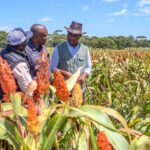Zambia is renowned for its vast copper reserves, but the country also boasts a wealth of investment opportunities outside the mining sector. With its strategic location, diverse economy, and favorable investment climate, several non-mining industries present lucrative prospects for investors. Here are the top five non-copper mining investments in Zambia:
1. Agriculture and Agro-Processing
Agriculture is a cornerstone of Zambia’s economy, contributing significantly to GDP and employment. The country has favorable climatic conditions and arable land, making it ideal for producing crops such as maize, soybeans, and tobacco. Additionally, agro-processing offers investment opportunities in food processing, packaging, and distribution. Investments in this sector can benefit from growing local and regional demand for processed food products, particularly as Zambia seeks to enhance food security and reduce imports.
Key Opportunities:
- Crop production: Focusing on cash crops and staple foods.
- Agro-processing: Establishing processing plants for value-added products like flour, oils, and canned goods.
2. Tourism and Hospitality
Zambia is home to some of Africa’s most stunning natural attractions, including Victoria Falls, the Zambezi River, and numerous national parks teeming with wildlife. The tourism sector is ripe for investment, with opportunities in eco-tourism, luxury lodges, and adventure tourism activities like white-water rafting and safaris. The Zambian government has also been promoting tourism to diversify the economy and increase foreign exchange earnings.
Key Opportunities:
- Hotel and lodge development: Catering to both local and international tourists.
- Adventure tourism: Developing activities that showcase Zambia’s natural beauty and wildlife.
3. Renewable Energy
With increasing demand for energy and frequent power shortages, Zambia has made significant strides in the renewable energy sector. The country has abundant resources for hydro, solar, and biomass energy production. Investments in renewable energy can help address the energy crisis while providing sustainable power solutions to both urban and rural areas.
Key Opportunities:
- Solar power projects: Setting up solar farms to supply electricity to the grid.
- Hydropower: Investing in small and medium-sized hydropower plants on rivers.
4. Manufacturing
Zambia’s manufacturing sector is growing, supported by government initiatives aimed at promoting local production and reducing imports. There are opportunities in various manufacturing industries, including textiles, food and beverages, and building materials. The African Continental Free Trade Area (AfCFTA) also opens up markets for Zambian manufacturers, enabling them to export their products to other African countries.
Key Opportunities:
- Textile and garment production: Tapping into local and regional fashion markets.
- Building materials: Manufacturing bricks, tiles, and cement to support the construction boom.
5. Information and Communication Technology (ICT)
The ICT sector in Zambia is expanding rapidly, driven by increased internet penetration and a young, tech-savvy population. Investments in ICT can tap into the growing demand for digital services, mobile applications, and e-commerce. The Zambian government has also recognized the importance of ICT in driving economic growth and has implemented policies to enhance the digital landscape.
Key Opportunities:
- Startups and tech hubs: Supporting innovative tech solutions and entrepreneurship.
- E-commerce platforms: Developing online marketplaces to facilitate trade.
Zambia offers a diverse array of investment opportunities beyond copper mining, making it an attractive destination for investors seeking growth in emerging sectors. From agriculture to renewable energy and ICT, the potential for returns is significant, bolstered by a favorable investment climate and government support. As Zambia continues to diversify its economy, investors can capitalize on these non-copper mining ventures to contribute to sustainable development while reaping substantial rewards.






